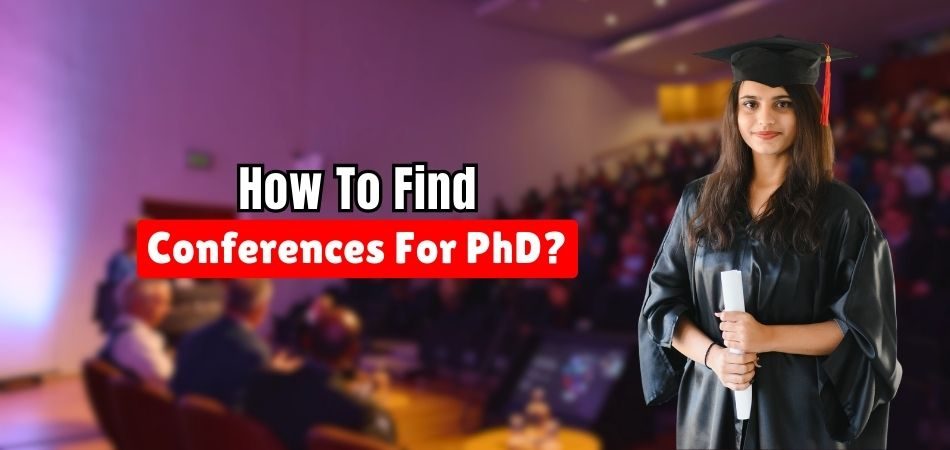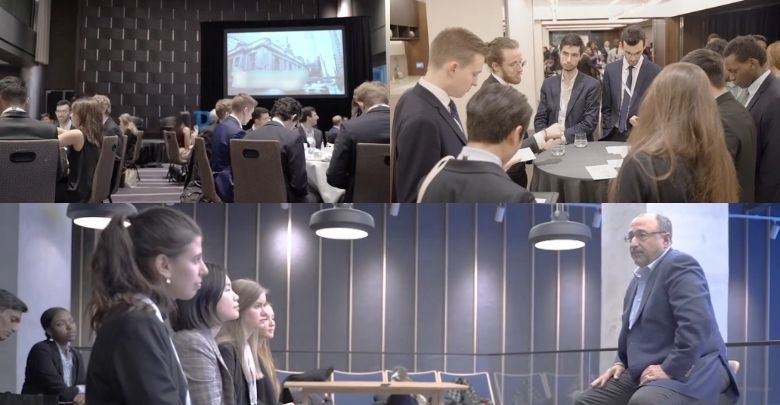Conferences have become a valuable platform for knowledge sharing, where researchers, academics, and professionals come together to exchange ideas, showcase their work, and learn from each other. As a PhD student, you might be wondering how to find conferences for PhD, to improve your research and make valuable connections in your field.
The best way to find conferences is by utilizing university resources, exploring online conference directories, joining academic societies, and using social media. Additionally, attending workshops, asking peers for recommendations, and using conference listing websites can help you discover relevant conferences that align with your research interests.
Would you like to know which conference is best suited to your academic path? Dive into this article, where you’ll find all the necessary information to guide you in selecting the best conferences for your PhD.
Why Attending Conferences is Essential for PhD Students?
For PhD students, attending conferences is crucial because it allows them to present their research and receive feedback. Engaging with peers and experts in their field helps to refine ideas, sharpen critical thinking, and improve communication skills. This opportunity improves a student’s ability to articulate their findings to a broader audience.

Moreover, conferences offer an excellent platform for networking. Building relationships with researchers, academics, and professionals can open doors to future collaborations, research opportunities, and even job prospects. For those interested in expanding their academic reach, exploring upcoming conferences in Canada can offer a chance to connect with an international community and gain insights specific to their field in a new regional context.
Additionally, attending conferences keeps students updated on the latest trends and developments in their discipline. Conferences provide access to current research, innovative methodologies, and groundbreaking discoveries. This helps PhD students stay relevant and incorporate new knowledge into their work, which can improve their project and overall research process.
Types of Conferences Should PhD Students Attend
Participating in conferences is an essential step for PhD students seeking to enhance their academic journey. These events offer valuable opportunities for learning, networking, and professional growth. Selecting the right types of conferences can make a significant difference in their experience.
- International Academic Conferences: Engaging with the global academic community allows students to gain diverse insights and broaden their research perspectives. It also provides a platform to present your work to an international audience.
- National Discipline-Specific Conferences: These events focus on specific fields within a country, allowing students to connect with leading researchers and stay updated on national developments in their area of study.
- Interdisciplinary Conferences: Exploring conferences that cross traditional subject boundaries can inspire new ideas and promote innovative research approaches. They encourage collaboration across different fields.
- Graduate Student Conferences: Events organized for and by graduate students create a supportive environment for presenting early-stage research and receiving constructive feedback from peers.
- Workshops and Symposiums: A smaller, more focused gathering offers specialized learning opportunities and skill development, often including hands-on sessions.
- Industry Conferences: Attending industry events helps students understand practical applications of their research and opens doors to potential career opportunities outside academia.
By thoughtfully choosing which conferences to attend, PhD students can enrich their academic journey and build valuable connections. Engaging in these events contributes significantly to their personal and professional development.
How to Find Conferences for PhD?
The right conferences can significantly improve your academic career as a PhD student. By utilizing various resources and strategies, you can discover events that align with your research interests, provide networking opportunities, and offer valuable insights into your field.
Utilize University Resources
Most universities have resources dedicated to helping students find relevant conferences. Check your department’s bulletin boards, newsletters, or official websites for announcements about upcoming events. Faculty members may also have insights into conferences in your field. Using this internal network can be an excellent starting point for discovering valuable opportunities to attend.
Use Conference Organizer Websites
You will find several websites like Global Conference Alliance Inc. organize different types of conferences with information from various sources, simplifying the search for events. These sites categorize conferences by topic, date, and location, making it easier for you to find what you need. Utilizing these platforms can streamline the process of finding conferences to attend, as they consolidate numerous listings in one convenient location.
Search Online Conference Directories
There are several online platforms that specialize in listing academic conferences. Some websites allow users to search by discipline, location, and date. These directories are invaluable for finding conferences to attend, as they provide a wide range of options and filter functions according to specific research interests and preferences.
Join Academic Societies
Becoming a member of academic societies related to your field can offer access to exclusive conference listings and opportunities. These organizations often host their events and share information about relevant conferences. Joining such societies can expand your professional network while keeping you informed about the latest happenings in your area of study.
Take Advantage of Social Media
Social media platforms like Twitter and LinkedIn are excellent tools for discovering conferences. Many organizations and researchers promote their events on these platforms, allowing you to stay informed. Following relevant hashtags and joining academic groups can lead you to new opportunities that may not be listed on traditional conference directories.
Attend Workshops and Seminars
Participating in workshops and seminars can provide insights into upcoming conferences. These events often attract individuals who are active in the academic community. Networking at these gatherings allows you to engage with fellow researchers, leading to recommendations for relevant conferences that align with your research interests and professional goals.
Ask Peers and Colleagues
Your peers can be an excellent source of information regarding upcoming conferences. Many of them may have attended events in the past and can share their experiences and insights. When you ask colleagues for recommendations, you may be able to attend conferences that you would otherwise not have been able to attend.
Explore Academic Journals
Many academic journals publish information about upcoming conferences related to their field. Regularly reviewing the latest issues can provide valuable insights into relevant events. Journals often include advertisements for conferences, making them a useful resource for staying updated on opportunities that are closely aligned with your research focus.
Engaging in these strategies will help you efficiently locate conferences that align with your research interests. By actively searching for opportunities, you can improve your academic experience and expand your professional network within your field.
What Should a PhD Student Consider Before Attending a Conference?
It can be incredibly beneficial for PhD students to attend conferences, as they allow them to share research, learn, and network with others. Preparing well is essential to maximize the benefits of the event. Here are key considerations to keep in mind before attending.
Relevance of the Conference
Before attending, ensure the conference aligns with your research interests and academic goals. Look at the themes, topics, and key speakers to determine if they resonate with your work. A relevant conference can provide insights that enhance your research and create meaningful connections with like-minded professionals.
Budget and Funding
Consider the financial aspects of attending a conference, including registration fees, travel costs, and accommodation. Determine whether your institution offers funding for conference attendance or if there are grants available for students. Budgeting effectively will help ensure that you can participate without financial strain.
Collaboration Opportunities
Conferences offer unique networking opportunities, allowing you to connect with professionals in your field. Research who will be attending and consider reaching out to them beforehand. Building relationships with fellow attendees, speakers, and potential collaborators can lead to valuable connections that benefit your academic and professional development.
Presentation Opportunities
If you plan to present your research, review the submission guidelines and deadlines carefully. Prepare your presentation materials well in advance, ensuring they meet the conference’s standards. Engaging effectively with your audience can lead to constructive feedback and new ideas, enhancing your overall experience.
Schedule and Sessions
Review the conference schedule thoroughly to identify sessions, workshops, and panels that interest you. Prioritize which events to attend based on your research goals and networking opportunities. A well-planned schedule can help you make the most of the conference, ensuring you gain valuable insights and experiences.
Careful planning and consideration are essential for maximizing the benefits of attending a conference. By considering relevance, budget, network, presentation, and scheduling, PhD students can make informed academic and professional choices. Engaging in these practices will lead to a more rewarding conference experience.
Tips for Making the Most of a Conference as a PhD Student
You can showcase your research and connect with other professionals at conferences as a PhD student. By planning properly and engaging effectively, you can maximize the benefits of your conference experience and build valuable relationships.
Prepare Thoroughly Before Attending
Before heading to the conference, make sure to thoroughly prepare. Research the conference’s focus and participants to know who you’ll be engaging with. If you want to present your research, reviewing the steps to find conferences for presenting research can help you register for the right events where your work will resonate. This will help you attend with confidence, knowing your presentation aligns with the theme.
Network with Other Attendees
Conferences are excellent places to meet fellow researchers and professionals in your field. Make a point to introduce yourself to others during sessions, workshops, and social events. Sharing your interests and asking about theirs can lead to meaningful connections. Building a strong network can open doors to collaborations and opportunities in the future, improving your academic journey.
Attend Relevant Sessions
To get the most out of your conference experience, attend sessions that are relevant to your research area. This will help you stay informed about the latest developments and trends in your field. It’s also beneficial to participate in discussions and ask questions, as this engagement can further enrich your learning experience and provide insights into finding conferences that align with your research interests.
Follow Up After the Conference
After the conference, take time to follow up with the people you met. Send a brief email expressing appreciation for their time and referencing your conversation. This simple gesture helps solidify connections and keeps you on their radar for future collaborations. Following up also allows you to continue the discussions sparked during the conference and nurture relationships.
Utilize Online Resources
Take advantage of online resources to enhance your conference experience. Research various platforms that list upcoming events relevant to your field. To identify conferences that align with your academic goals, you need to know how to search these resources effectively.
Getting the most out of your conference experience involves preparation, networking, and ongoing engagement. By implementing these strategies, you can improve your learning, build professional relationships, and further your academic career. Taking these steps will ensure you make the most of each opportunity you encounter at conferences.
Frequently Asked Questions
It can be difficult to find the right conferences as a PhD student, but it’s crucial for advancing your academic career. Below are some frequently asked questions to guide you through the process of finding and attending conferences that align with your research and academic goals.
How Can I Stay Updated on Upcoming Conferences?
To stay updated on upcoming conferences, subscribe to academic newsletters and follow relevant academic societies. Setting up email alerts on conference directories is also beneficial. Additionally, social media platforms like LinkedIn and Twitter provide timely updates. Engaging with online groups focused on your field can help keep you informed.
What Are the Best Platforms to Search for Conferences?
Some of the best platforms for finding conferences include Global Conference Alliance Inc. These websites offer convenient filtering options to search by discipline, location, and date. Moreover, many academic associations provide exclusive conference listings for their members, making them invaluable for discovering niche events.
Can Professors Help Me Find Suitable Conferences?
Yes, professors and academic advisors are excellent resources for discovering relevant conferences. They often have industry connections and insights about upcoming events. Don’t hesitate to ask them for suggestions tailored to your research area, and inquire if they are attending any notable conferences themselves for additional networking.
Is It Possible to Find Funding for Conference Attendance?
Yes, many universities offer funding options for PhD students to attend conferences. You should check with your department or research funding office for available grants or scholarships. Additionally, some conferences provide travel grants for students presenting their research, so be sure to review the funding opportunities for each event.
How Early Should I Start Looking for Conferences?
It’s advisable to start searching for conferences at least 6 to 12 months in advance. This timeframe allows proper planning, submitting abstracts, and securing funding. Conference deadlines for paper submissions often close months before the actual event, making early preparation essential for successful participation.
Last Word
A PhD student’s participation in conferences can significantly boost their academic careers, allowing them to learn from others in their field, present their research, and network. It’s a valuable way to stay engaged with the latest trends and developments that can add value to your work.
When wondering how to find conferences for PhD, you can explore university resources, online conference directories, academic societies, and social media platforms. These avenues provide diverse options to discover conferences that align with your research and professional goals, helping you stay connected to relevant events.
As you begin your search, remember to plan early, stay organized, and keep an eye on funding opportunities. We wish you the best of luck in finding the right conferences and making the most of these academic experiences!







